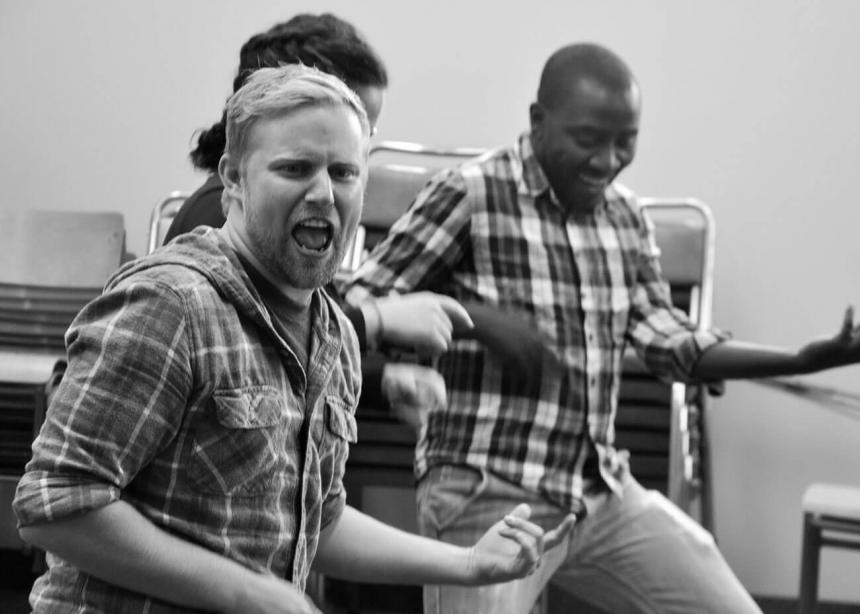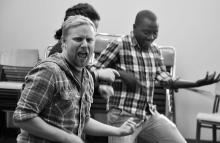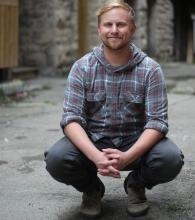Winnipeg filmmaker Brad Leitch’s next project is a deeply personal one.
The 30-year-old, who attends Hope Mennonite Church in the city, is making a documentary about “playback theatre,” a form of performance art that involves audience members sharing a story from their lives and an acting troupe immediately playing back that story using a variety of improvisational techniques.
Leitch first got involved in playback theatre three years ago while studying peace and conflict transformation at Canadian Mennonite University (CMU). In the field of peacebuilding, it is being used as a conflict-transformation tool for education.
Leitch has experienced firsthand the power of playback. “As we share our stories [with] each other, it really does make an impact and lead to meaningful transformation,” he said.
When Canadian Mennonite spoke with Leitch during the first week of October, he had just released Reserve 107: Reconciliation on the Prairies, a short documentary he filmed about indigenous-settler relations in Laird, Sask. He was also in the midst of a campaign to raise funds to make the playback theatre documentary.
At that point, he had raised $17,000, good enough to make, at the very least, a short documentary. “I can stretch a budget, and I know we can do a lot of really good things with that,” Leitch said. “We’re totally, totally thrilled.”
CM: How did you first get involved with theatre?
BL: I first started to dabble in some high-school and grade-school plays. That kind of changed for me [later] in high school, and I kind of stepped away from theatre for a while just because it was too difficult. I maintained that passion and that love for theatre, but it would be many years until I would actually come back to it. That would be specifically through playback theatre.
CM: Why did doing theatre become difficult?
BL: In high school I started to develop a lot of symptoms connected to anxiety and panic disorders. There was a certain pe-riod of time where I literally lost my ability to speak in public settings. I had already done a high-school play performance, but as a lot of these symptoms and experiences started to develop and become worse and inhibit my life in even just some basic, simple ways, I kind of went into hiding. It was an educator who really encouraged me to come back to theatre and join a drama class, and then eventually try out for some of the high-school plays in my senior year. That brought me back into theatre in that season of life.
CM: How did you discover playback theatre?
BL: It was basically a three-day workshop class that I took [at CMU]. A couple troupe members from a local group called Red Threads of Peace came out and introduced us to playback theatre. I really loved the workshop.
It was really that first time since high school where I found that I was performing again without even realizing it, because [playback is] such a gentle way of bringing people into a performance. It’s not just for “quote-unquote” professional actors. I was embodying the character of somebody else. I loved that and I missed it, so when the invite came to anybody who wanted to join their regular play dates that they had, I said yes.
I would just go every week to hang out with the troupe and practise different forms of playback. It was a great outlet alongside my other work. Filmmaking for me a lot of times is a very solitary process, so to create with other people through playback theatre was incredibly meaningful.
CM: How did the documentary come about?
BL: I’m just falling too much in love [with playback theatre] and really want to share [it] with other people. There are elements of it that are profoundly understated. There’s no massive stage with lights, we don’t have a lot of props, but what we have is our creative capacity to empathize and to embody another story. It becomes a profoundly personal thing as a playback troupe plays back somebody’s story that’s so meaningful to them, and they, for the first time, discover something about themselves or are reaffirmed in something of their own story for the first time.
As theatre actors, you have the opportunity to play that back. Even the moment that brings somebody to tell a story there, especially if it’s one of vulnerability, there’s a huge journey prior to that point. So, as a filmmaker, I know there’s something really interesting I can do with telling the stories of the people of playback theatre, both as actors and as audience members, both inside and outside of that theatre space.
The interview has been edited and condensed. To learn more, visit playbackfilm.ca.
See also “CMU recognizes distinguished alumni with 2016 awards.”






Add new comment
Canadian Mennonite invites comments and encourages constructive discussion about our content. Actual full names (first and last) are required. Comments are moderated and may be edited. They will not appear online until approved and will be posted during business hours. Some comments may be reproduced in print.